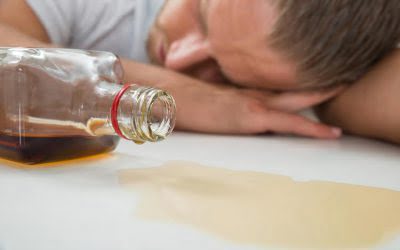Videos de Sexo > Sober living > Excuses and Signs of the High-Functioning Alcoholic
Descricao do video:
Content
Alcoholism is a progressive disease, but it doesn’t have to get worse before it gets better. Even if you or the person you know who is functioning with alcoholism hasn’t yet faced a DUI, isolation, or medical problems – it is never too soon to ask for help and receive the proper treatment. They get the kids to school on time, they attend obligations, fulfill responsibilities and are often very successful in many areas of life. If you cover for your loved one by lying to their boss, for example, they won’t experience the negative consequences of their drinking and will remain in denial. A more appropriate way to screen patients for alcohol impairment would be to use a standardized and more detailed review of patterns of drinking and alcohol-related problems such as the ten item AUDIT. This instrument takes only a few minutes complete and can be filled out by patients in the waiting room (Babor, 2001; Sanchez-Roige et al., 2019). Such standardized approaches might be especially useful for identifying high functioning individuals with AUDs whose SES might erroneously imply that they are less likely to have alcohol problems.
- Check out our new webinar series that unites recovery speakers from across the country in order to share a collective set of strategies and expertise.
- The type of denial we will deal with in this test is Type B, honestly being dishonest.
- The National Harm Reduction Coalition is an advocacy group for people living with substance use disorder.
- Although some agencies may have the equipment and trained personnel to administer an alcohol test, such a test would be voluntary.
- Instead, you can focus on their behavior and the consequences of their actions.
- Type B denialis when a person is either partially or totally blind to a problem that they have.
Our admissions team can provide information on intervention services, addiction treatment program options, and detoxification services offered at our luxury Malibu California rehab. In my own personal experience, after hitting an emotional bottom there was 90% of my rational self that recognized I was alcoholic and 10% that did not. Only 10% was my denial, yet it had more influence over my thinking than the 90%.
Fear of Treatment
If you live with alcohol use disorder, your family may play a crucial role in your recovery. You might also find it helpful to talk with a counselor or therapist who specializes in alcohol use disorder. You can also visit the NIAAA Rethinking Drinking website or read the NIAAA treatment guide to learn more about alcohol use disorder and to find help for your loved one. The NIAAA Alcohol Treatment Navigator is a great tool that provides more information about alcohol use disorder, how to find treatment, and how to find support. If you or someone you know is living with alcohol use disorder, there are a number of resources that can help.

Usually, by the time the disease has gotten to the crisis point, a person with alcoholism has developed a support system of family and friends who unwittingly enable him to continue in his denial. They can display secondary denial, making similar excuses for the drinking and its consequences. If the employee is willing, he or she may be sent to the health unit for observation or a possible assessment. Health unit personnel may be able to offer a medical judgment that, in their opinion, the employee is intoxicated.
How To Find the Courage To Start Your Life in Recovery
Instead, she recommends seeking more formal support with Al-Anon or therapy to help you create boundaries and care for yourself. According to Conroy, it may be easy to get caught in denial with AUD if you subconsciously feel something is wrong https://ecosoberhouse.com/ with you at your core. It also might mean admitting that they don’t have it all together, and their exterior world is crumbling. “In some families, drinking too much is seen as comical, not a big deal, or a must during celebrations,” she adds.
Comparing — when approached about drinking habits, an alcoholic may shrug the statements off by naming a person who drinks more than them, or who acts extreme while drinking. Lying about quitting — this type of denial occurs when the person falsely states that they will quit or that their drinking is an issue. Being dishonest or lying about alcohol consumption is pretty common with alcoholism.
Overcoming Stage One Denial
Some researchers also propose that denial may be the result of cognitive impairments linked to alcohol use disorder. People with AUD may have difficulties with insight, working memory, complex thought, and problem solving. In this post, we’ll discuss how and why denial happens, its role in addiction, common signs, and how to help someone who may be in denial. Ria Health offers several FDA-approved medications for alcohol use disorder. When combined with counseling, this approach is proven highly effective.

There, they can connect with other people recovering from substance use disorders and learn valuable coping skills. If your loved one refuses to discuss their disorder, contact a therapist, addiction interventionist, or other Alcoholism and Denial behavioral health care provider. They can help you design a more personalized plan for talking to your loved one. For example, many people drink to cope with mental health concerns like stress, grief, or depression.
Reasons for denial in alcohol use disorder
No matter how functional an alcoholic is, the nature of the disease will eventually start to wear them down. Becoming defensive — instead of simply answering a question about their drinking, the person starts to defend their decision to drink. Hiding — avoiding telling others that they are drinking or even denying when directly asked. Blame — placing responsibility for drinking on another person or circumstance. The people cared about me and the people took me under their wing. They not only saved my life, but they saved my brothers and in a way my sons.
The current analyses focus on inaccurate denial of current AUDs in individuals who report themselves as light or moderate social drinkers. To prepare for the study we searched the literature for specific characteristics of individuals who evidence denial. Marital status and education level did not consistently relate to the probability of denial (Ortega and Alegria, 2005; Rinn et al, 2002), although one study suggested more denial among lower educated individuals . This is especially true when it comes to those addicted to alcohol or drugs. An addict can come up with a million excuses for why they use, and some of them sound real enough for them to believe it themselves.
Some high-functioning alcoholics will laugh off their alcohol consumption and drinking episodes to validate that their drinking is a choice. Despite having few negative consequences and stronger lines of denial to hide behind, those who are high-functioning alcoholics are not immune to the effects of alcohol. Those who are drinking at an alcoholic level are still doing tremendous damage to their brains and bodies – and putting others in harms way. The SRE records numbers of standard drinks required for up to four effects including a first effect, feeling dizzy or slurring speech, unstable standing, and unplanned falling asleep. SRE-5 scores for the first five times of drinking and is generated by the total drinks in that period needed across effects divided by the number of effects endorsed. SRE-T scores reflect the average across first five, heaviest drinking period, and recent 3-month drinking.

Although some prior studies reported a higher rate of denial in African American and Hispanic individuals (e.g., Clarke et al., 2016), that could not be adequately tested in the SDPS sample. Denial of an overarching alcohol problem despite endorsement of specific alcohol-related difficulties may be central to development and continuation of alcohol use disorders .


